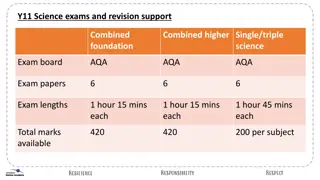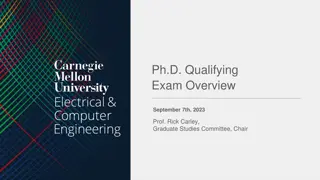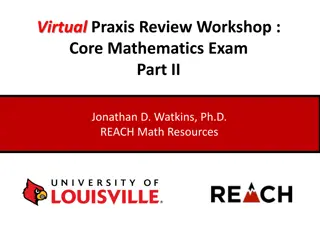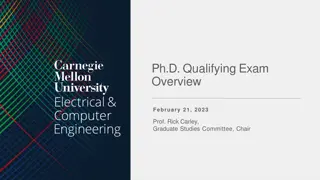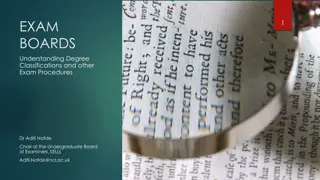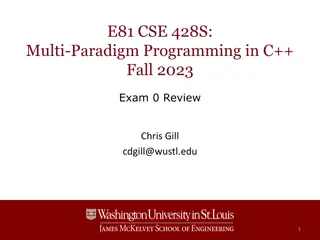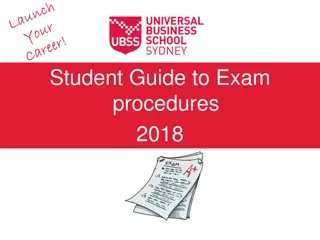Understanding Exam Results: A Comprehensive Guide for Students
This comprehensive guide covers how exam results are calculated, accessing your results online, understanding your result details, and interpreting progression categories. Learn about supplemental exams, appeals processes, and support resources available. Get insights on credit calculations, marks interpretation, and what different progression statuses mean for your academic journey. Prepare for navigating your results effectively and making informed decisions for your educational path.
Download Presentation

Please find below an Image/Link to download the presentation.
The content on the website is provided AS IS for your information and personal use only. It may not be sold, licensed, or shared on other websites without obtaining consent from the author. Download presentation by click this link. If you encounter any issues during the download, it is possible that the publisher has removed the file from their server.
E N D
Presentation Transcript
Exam Results Explained Info Session #BeSeptemberReady April 2022 Rose Donovan Academic Advisor
What we will cover How results are calculated How to access your results The various progression categories and what they mean What next: supplemental exams, repeating, reviewing scripts, rechecking results and the appeals process Key referral points: including Academic and Non-Academic supports Academic Advisory Office, Centrefor Teaching& Learning
How results are calculated Your annual mark is calculated by taking the credit weighted average of your module marks, excludingany ungraded modules (only modules that you have passed and earned credits in are included in the calculation). Your subject mark is calculated as the average of all your marks in modules taken in that subject (all marks are included in the calculation including the marks from modules you have not passed). Academic Advisory Office, Centrefor Teaching& Learning
How to access your results When results are issued they will be released online and you can access them by logging in via Student Web Academic Advisory Office, Centrefor Teaching& Learning
How to access your results Select Student Enquiry and then Exam Results Academic Advisory Office, Centrefor Teaching& Learning
How to read/understand your results Award Mark:: This box only appears when graduating Annual mark result : Shows the mark for this period of study and only includes modules you have passed Credits Academic Year: shows total number of credits earned for your current academic year Credits Period of Study: shows the total cumulative credits earned in this period of study. If repeating a period of study, it will include previously earned credits. Credits to date: Shows the total earned for a first year student this should read as 60 credits Academic Advisory Office, Centre for Teaching & Learning
What do my results mean Progress - This means you have passed all modules and can progress to the next year of study Restricted Compensation - You have not achieved the pass mark in all of your modules but you have achieved sufficient marks to allow you pass by compensation. Because you have some modules which are passed by compensation this means your progression in this subject could be restricted. This means you can only progress in the subject(s) you have achieved a progression result in. You can progress to the next year of study in any subject that has a result of Pass(P), Pass by Compensation (PC) or Allowed Progression (AP). You might have progression results in all of your subjects and this restriction will not affect your choice of subjects in second year . Any subject that you have not got a progression in requires you to resit the supplemental exams in that subject if you wish to continue with it. Academic Advisory Office, Centrefor Teaching& Learning
What do my results mean Restricted Deficit - This means you have modules that were not eligible for compensation and you now have a credit deficit. You can choose to progress to the next year carrying the deficit, usually in your other subjects but you will have to take additional credits to make this up in the next year or before you graduate. - Even though you are allowed progress , we strongly recommend you register for and attempt the supplemental exam for that module(s) and try to clear the deficit. Progressing carrying a deficit means paying extra fees and more lectures / exams in the next year. - Due to not passing, your result is restricted, so you can only progress in the subjects you have passed. - Registering for the supplemental exams requires you to complete the online form which will be available on the Exams Office webpage after the results have issued. Academic Advisory Office, Centrefor Teaching& Learning
What do my results mean Restricted Progression - This means you have sufficient modules to progress but there are some modules that you have not passed. The restriction applied is that you can only progress in the subjects that have a progression result. Restricted No Progression This means your results allowed you to compensate and the compensation has been applied to your results. Your marks in a module were in the range of 35-39. However, you do not have a combination of subjects with a progression result that will allow you progress into second year. You will have to register for and pass the supplemental exams to progress, otherwise, you will have to register to repeat the year. Not Progress You cannot progress, your marks are not in the compensation range, therefore you will have to register for and pass the supplemental exams or repeat the academic year Academic Advisory Office, Centrefor Teaching& Learning
What do my results mean? A summary Result Progress Criteria All modules passed without compensation. Implications Progress to next year. Restricted Compensation Average mark at or over pass threshold (40%) AND All modules over compensation threshold (35%) AND At least half of the credits over pass threshold A maximum of 10 credits below compensation threshold (35%) AND meets compensation rules above in other 50 credits Progression allowed only in subjects that have been passed and have a grade of Pass(P), Pass by Compensation (PC) or Allowed Progression (AP) Restricted Deficit Progression allowed only in subjects that have been passed or have permission to progress with deficit. Students must make up credit deficit in Year 2, 3 or 4 Restricted No Progression You have met the requirements to compensate but you have no viable progression pathway You must register for any module(s) you have not passed in the August supplemental exams and pass the modules and earn the credits to allow you progress Academic Advisory Office, Centrefor Teaching& Learning
What do my results mean? A summary Result Explanation Implication Not progress More than 10 credits below the compensation threshold (35%) OR Less than 50% of credits above the pass threshold (40%) OR Average mark in best 50 credits is less than the pass threshold. Progression is not allowed. You have not achieved a pass mark in sufficient modules to allow you progress. Academic Advisory Office, Centrefor Teaching& Learning
Options if you do not pass a module Supplemental Assessments / Exams An opportunity to re-sit some or all of the assessment in August Register for the supplemental assessments / exams via online form available on the Exams Office webpage available from Monday 27th June Check the moodle page for the module /subject to see how it is being assessed in the Supplemental exams and/or contact the Admin Office of the subject you have not passed No charge for Supplemental exams this year 1. 2. Repeating in the next academic year If you do not pass a module you can repeat it the following year or take an alternative module in its place if available or change subject Changing subjects and repeating will have Fee and SUSI implications as well as the period of time it will take you to graduate Academic Advisory Office, Centrefor Teaching& Learning
Frequently Asked Questions I have passed /passed by compensation all modules in the subject , so why is the subject result reading as not passed? You may not have an average mark of 40 in the subject so the result is not passed. - You have not passed at least half of the credits in the subject without using compensation so again the result is not passed - If you have a pass by compensation (PC) result in a module that is a required module for the subject then you will not have passed . Any required module or module with an R indicator must be passed without compensation Academic Advisory Office, Centrefor Teaching& Learning
Frequently Asked Questions My annual mark is over 40 so why is my overall result not progress? - The annual mark is calculated as the credit weighted average mark in the modules where you have earned credits. If you have modules that you did not pass, these are then excluded from the calculation. You should check the number of credits you have passed and if you have not got sufficient credits passed your result will be a Not Progress. You should always have a look at Marks and Standards for a more in-depth explanation of the rules: Marks and Standards Academic Advisory Office, Centrefor Teaching& Learning
Consultation Day & Rechecks/Appeals Rechecks & Appeals Consultation Day June 28th Staff available in all Departments to discuss results. You have the option of a recheck and/or an appeal of an exam mark. Students are entitled to see their examination scripts if they wish by arrangement It is strongly recommended that you first attend consultation day to meet with your dept. about the exam mark before applying for a recheck or appeal. Please contact the relevant department/school directly for details. Academic Advisory Office, Centrefor Teaching& Learning
Process to Recheck Exam Results Download, complete and return the ExaminationResult Recheck Request form (Form RE2) to the Registrar s Office within two weeks of the release of results A fee of 25.00 per subject applies for checking a result A recheck does not involve the reassessmentof work, or alter any academic judgement made in assessment The Registrarwill inform the student of the outcome of their recheck and, if recommended by the Head of Dept, will arrangeto have the result amended Link to information on Exams Webpage Recheck and Review Academic Advisory Office, Centrefor Teaching& Learning
Appeals Process An appeal of an exam result shall be considered: (a) If there is evidence of substantive irregularity in the conduct of the exam (b) If there are circumstances which the Programme Examination Board was not aware of when its decision was taken. Process: 1)Students wishing to appeal should write to the Registrar setting out grounds for the appeal within 3 weeks of the results being released. 2)A completed Examination Appeal Form, available on the Registry website, must also be submitted along with the detailed statementabove. 3) A fee of 60.00 per subject is applied for an examination appeal. Link to information on Exams Webpage: Appeals AcademicAdvisory Office,CentreforTeaching& Learning
Who can I talk to about my results: Academic Supports Academic Departments, you should email the Lecturers who taught the module and include the Admin office in the email Exam Results Information Centre : available online only email your questions to examresultsinfo@mu.ie and a call back can be arranged if necessary or your query can be answered via email Academic Advisory Office email: advisory.office@mu.ie AcademicAdvisoryOffice,Centrefor Teaching& Learning
Other Student Supports available Student Budgeting Advice Service Student Counselling Service Student Fees and Grants Academic Advisory Office, Centrefor Teaching& Learning
Any questions ? Academic Advisory Office, Centrefor Teaching& Learning
Programme Advisory Office ContactDetails HOW TO CONTACT US: Email: examresultsinfo@mu.ie or advisory.office@mu.ie Webpage and query form: https://www.maynoothuniversity.ie/centre-teaching- and-learning/academic-advisory-office Academic Advisory Office, Centre forTeaching &Learning















